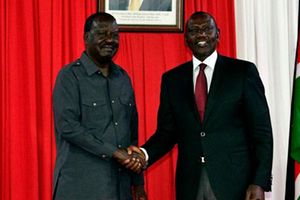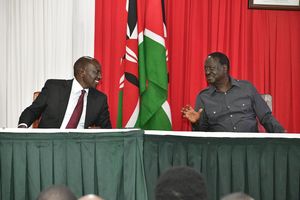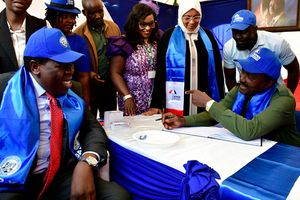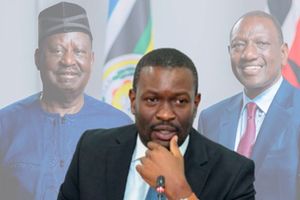
President William Ruto and opposition leader Raila Odinga sign an agreement between UDA and ODM in the presence of their party members.
MPs allied to President William Ruto and former Prime Minister Raila Odinga have given Nation.Africa details of how they will go about fast-tracking and implementing the deal between UDA and ODM.
Top among the plans is the consideration of the National Dialogue Committee (Nadco), which President Ruto and Mr Odinga listed as their topmost priority, and which recommends, among others, the creations of the office of the Prime Minister as well as that of the Official Leader of Opposition.
Despite the National Assembly Justice and Legal Affairs Committee butchering the report and declaring most of the proposals unconstitutional or in conflict with other laws, MPs allied to Dr Ruto and Mr Odinga say they still have a window to have all recommendations of the document—which Mr Odinga had ordered MPs to pass “without changing a comma”—adopted by the House and implemented immediately.
National Assembly Minority Leader Junet Mohammed has revealed that the House will be moved to reject the committee report and revert to the original proposals of the document.
“The Justice and Legal Affairs Committee were not bringing any new Bill, they just proposed an amendment to an existing report, which we are going to reject as a House if they don’t make sense,” Mr Mohamed said.
He added: “We are now going to give the report priority in the House Business Committee (HBC) because it is at the centre of this MoU.”
Justice and Legal Affairs Committee chairman George Murugara said that even though the committee had rejected most parts of the report, the House has the final say.
“Ours were only observations. The House can agree or not agree with us,” Mr Murugara said.
Kisumu West MP Rozah Buyu said since there is now political goodwill, MPs will look at the contentious parts that informed the rejection by the legal committee and seek to get a consensus.
“For most MPs, the most important thing is to have a stable country, anything that will give us stability, if it is the Nadco report, then it should be given priority,” Ms Buyu said.
In considering the report, the House can reject in total the recommendations of the committee and consider the Nadco report original form or propose further amendments in addition to that of the committee.
The report was tabled last year but it’s yet to be considered by the whole House. Had it been considered and its proposals adopted by the House, then amendments to such reports can only be re-introduced after six months.
The MoU between the two leaders is anchored on 10 points which were all captured in the Nadco committee recommendations that was co-chaired by Wiper leader Kalonzo Musyoka and National Assembly Majority Leader Kimani Ichung’wah.
The 10 points in the deal, besides the Nadco report implementation, includes calls for inclusivity in all spheres of life including budgetary allocations and public appointments; protection and strengthening evolution; economic investments and the mainstreaming of the youth and leadership and integrity.
Other pillars of the deal include the right to peaceful assembly and compensation of all pending claims of victims of rights infringements; an audit of national debts aimed at finding out how the debt was used; and an increased fight against corruption; and protection and strengthening of accountability institutions like the office of the Auditor-General, the Controller of Budget and the Ethics and Anti-Corruption Commission.
In addition, the deal also committed to stopping wastage of public resources and protecting the sovereignty of the people, respecting constitutionalism and the rule of law, stopping abductions, suppressing the will of the people and respecting press freedoms.
While Nadco is listed as a priority in the deal, the report also has most of the other key issues listed by the protagonists.
These include inclusivity in all spheres, right to peaceful assembly, leadership and integrity and protection of sovereignty of the people, respect of rule of law and safeguarding rights—with various proposals that fight into the omnibus law proposal.
Eldas MP Adan Keynan told Nation.Africa that the report should be treated as a “matter of national urgency” by the House.
He said since Nadco was a consensus report between a team from President Ruto’s and Mr Odinga’s sides, nothing stops Parliament from introducing further changes —including to implement all the other nine proposals, even those not explicitly in the report — to make it much better.
“Now that the two protagonists have come to the same table, nothing stops Parliament and other stakeholders from further improving the report,” Mr Keynan said.
He added: “Further improvement of the report can be introduced both at the policy and legislative level because the report contains a number of proposals in various aspects.”
Some of the proposals the committee rejected include creation of the office of the leader of official opposition, anchoring the Prime Ministers’ position in the constitution, seven-year term for the Senate and deregistration from a political party as part of the circumstances under which the seat of an MP may become vacant.
Among the Bills borne out of the report include the Constitution of Kenya (Amendment) Bill 2023, which if approved by Parliament will change the structure of government by seeking to introduce the office of the leader of official opposition and anchor in law the office of the prime minister, the Senate Oversight Fund, the National Government Affirmative Action Fund and the National Government-Constituency Development Fund (NG-CDF).
The committee in its report noted that entrenching the Office of the Leader of the Opposition in the constitution relates to the supremacy of the constitution, sovereignty of the people, national values and principles of governance hence requires a referendum.
The committee pokes holes in the proposals saying its establishment has no institutional framework and it’s also not clear whether the office will be a public or State office.
Further, the committee questioned where the office will be domiciled and under which arm of the government it will fall.
“The establishment of such an office in Kenya’s current system of government must be clearly defined in terms of its institutional framework and role,” reads the report.
The committee noted that the proposal undermines the current presidential system of governance in the country.
“The constitution does not envisage a member of the executive sitting in Parliament as implied in the proposed Nadco leader of opposition Bill. This will result in a change in the system of government, a decision reserved for the people,” reads the report.
The committee pointed out that according to Article 108 of the constitution, the National Assembly minority leader is essentially the leader of opposition in Parliament hence introducing the Office of the Leader of Opposition alters functions of Parliament. Creating the new post as envisaged would require a referendum.
There are also indications that creating the office of the Prime Minister requires a referendum.








